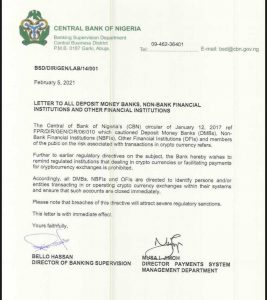The Central Bank of Nigeria (CBN) distributed a letter instructing banks and financial institutions to identify and close accounts of cryptocurrency transaction companies. The directive, which came into effect immediately, threatens financial institutions that fail to comply with “severe regulatory sanctions”.
Banks take action immediately
Immediately after the letter was published, some banks and other financial service providers began complying with the policy. Binance CEO Changpeng Zhao tweeted that his company had received a message from its Nigerian partners confirming that “naira deposits and withdrawals will be affected.” Other crypto startups like Quidax, Buycoins Africa and Bundle have announced that they will comply with the policy.
Meanwhile, the Nigerian crypto community is angry at the policy and many are calling the decision backward. Senator Ihenyen, the Stakeholder President of the Blockchain Technology Association of Nigeria (SIBAN), says the CBN needs to explain the decision especially now after the letter briefly “disappeared” on the CBN website. At the time of writing, a modified version of the letter appeared in place of the original version with typographical errors.

A “lazy” decision
In the meantime, according to Ihenyen, it is “badly aligned” for banks and other financial institutions to block customers simply because of the CBN letter. SIBAN President also suggests that the CBN may not have “legal or regulatory authority to simply order banks to refuse banking services to a group of people or an entire emerging industry”.
Ihenyen continues:
As I understand it, CBN can only regulate how banking services can be offered to these individuals by applying risk management such as KYC, AML / CFT regulations. In contrast to his letter of January 2017, the total ban is arbitrary, illegal, irresponsible and, with all due respect, rather lazy.
While some commentators have suggested that the CBN simply recycled its 2017 guideline, Ihenyen says that view is “wrong”. According to the SIBAN president, who is also an attorney, “the 2017 directive frowned upon cryptocurrency business in Nigeria and completely barred banks and other financial institutions from trading cryptocurrencies.”
However, the same 2017 directive “gave the same banks and financial institutions the leeway to provide banking services to cryptocurrency exchanges and traders on condition that KYC / AML guidelines are applied.” The most recent directive bans banks and other financial institutions unlike 2017 fully providing banking services for individuals involved in cryptocurrency trading and for companies involved in cryptocurrency exchanges.
Decline in the flow of transfers
While it’s not clear what might have sparked the CBN’s abrupt decision, speculation exists that the central bank may hit back on an industry that may diminish its influence. This is the view shared by Nathaniel Luz, the leader of Dash in Nigeria. Luz tells news.Bitcoin.com that the decline in remittances (a major source of foreign exchange) could be one of the reasons.

As data from Nairalytics shows, remittances to Nigeria via traditional corridors have decreased from $ 2.05 billion in January 2020 to $ 54.4 million received by September of that year. According to Luz, the CBN is now fighting back with this latest policy as many Nigerians are now switching to crypto-based remittance channels.
Still others have speculated that the CBN guideline may be an attempt to prevent the repetition of protests similar to those spearheaded by the Endsars movement. When authorities tried to stifle the protest by freezing Endsars’ bank accounts, protest leaders began asking for donations in bitcoin.
Meanwhile, some crypto influencers say they want to let the CBN know about the policy, which appears to contradict the stance of another Nigerian regulator, the Securities and Exchange Commission (SEC) of Nigeria. At the time of writing, the CBN has not made any further statement beyond the letter. News.Bitcoin.com will provide updates as more information becomes available.
What do you think of this decision by the CBN? You can share your thoughts in the comments below.
Photo credit: Shutterstock, Pixabay, Wiki Commons

